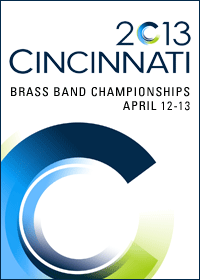4BR Time Team - Hargreaves and Fairey win the 1979 Open
31-Aug-20094BR looks back 30 years and Walter Hargreaves leading Fairey to a thrilling Open victory.
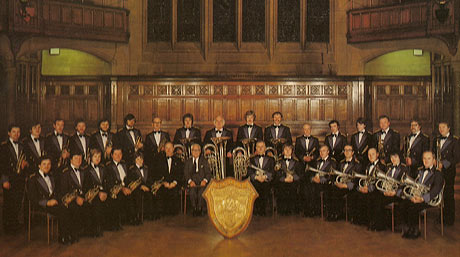
The 1979 British Open Champions - Fairey & Walter Hargreaves
The Fairey Engineering Band may have won the 1979 British Open, but the victory itself belonged to one man – Walter B Hargreaves.
The Wee Professor
Aged 72, and in the autumn years of his conducting career, ‘The Wee Professor’, steered Fairey to their first win at Belle Vue since 1965, to enable the Stockport band to maintain their remarkable record of registering at least one victory per decade at the King’s Hall since the 1940’s.
For the diminutive Scotsman though, the victory provided final confirmation of his place in the Pantheon of the great brass band conductors of the post war period.
Sought after
Despite the success, the most sought after conductor of his generation was so much more than the sum of victory pennants on his CV.
In 1968 he led Brighouse & Rastrick to the National title, and as a consequence, the ephemeral sobriquet of World Champion Band, but the British Open had remained tantalisingly out of his grasp, ever since he led Cory to second place on ‘Resurgam’, in 1950.
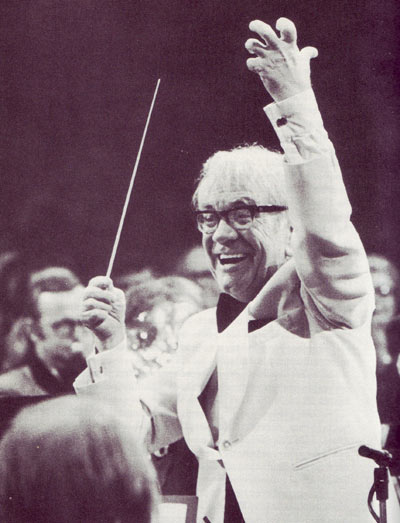
The Wee Professor - touched by genius
Touched by genius
Driven by an almost inexhaustible determination, a flamboyant persona and musical brain touched by genius, by the time of the 127th Open, the avuncular appearance and slicked back hair of the 1960s had been replaced by a somewhat unruly white mane and slightly wizened features – the result of a long and painful recovery from an accident, that diminished his physical attributes if not his personality.
Fairey too were a band in need of a touch of genius.
The glory years under Leonard Lamb at Belle Vue were long gone – the intervening appearances of the 1970s marked by occasional highs (two podium places in 1975 and 1977) and more than a few lows (three ‘no mentions’ and one non appearance in 1973).
Chemistry
Hargreaves came to the band in 1978, leading them to their first Regional title since 1963, although their first appearance at the Open resulted in a somewhat non descript 6th place on ‘Benvenuto Cellini’.
The chemistry though was beginning to work: victory at the Granada Band of the Year Contest in the May was a marker of substance, although the band members were shocked by the death soon after of their popular bass player Cliff Colwell.
The band had undergone some well over due personnel changes too, and with the likes of Lyndon Baglin on euphonium, John Maines on trombone and the youthful tyros of principal cornet Brian Taylor and Alan Wycherley on soprano (as well as the 14 year old Gary Maddocks on flugel horn), Fairey seemed to have the required performers in just the right place, when the announcement was made in July that ‘Le Carnaval Romain’ would be the test piece on 8th September.
Percussion
The Berlioz overture, although popular with both listeners and players, was a disappointingly monochrome arrangement by Frank Wright that had previously been used at the Nationals in 1966, although on this occasion it would benefit from the inclusion of percussion.
Full of colour, gaiety and touches of fearless abandonment in its original form, the brass band version lacked them all in transcription. The key to uncovering a modicum its kaleidoscopic excitement and cultured nuance on the second Saturday of September lay squarely in the hands of conductors with intuitive musical skills and razor sharp minds – and none had those attributes more than ‘The Wee Professor’.
”…the overture has plenty of excitement and adequate technical demands to ensure an enjoyable contest” said rather earnest British Bandsman, although the British Mouthpiece newspaper rather more accurately remarked; “…the test piece is not beyond the playing capabilities of all the bands taking part and this must make the task of the adjudicators very difficult.”
Clarity
All became clear once the contest begun on the stroke of 11.00am on a dank Manchester morning.
The draw saw many of the pre contest favourites in the 22 band field drawn favourably enough – although Wingates must have cursed the contesting gods after claiming number 1 for the third year in a row.
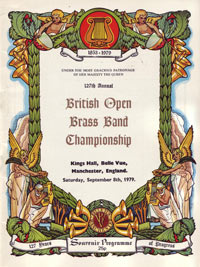 Defending champions
Defending champions
Meanwhile, the defending champions, Brighouse & Rastrick must have known their defence would be a hard one, drawn 3, whilst Black Dyke, most people’s favourites for the title, found themselves at 9. The rest were sprinkled liberally throughout the day – although in reality there were long periods of extended mediocrity.
The adjudication team of William Relton, Albert Chappell and Eric Wetherell would have a long day ahead (although they benefited from a break after band number 11), and after 8 bands had taken to the stage to perform in front of a packed hall (said to be close to 5,600 people), it was Besses o’ th’ Barn under Roy Newsome, drawn 4, who led the way.
Brighouse had come and gone – a brave defence that eventually saw them come 8th; so too Cory, Sun Life and GUS – all of whom came with high hopes of success. Now it was the turn of Black Dyke, followed by Grimethorpe and Fodens.
Inexcusable
Dyke delivered a mixed bag (“A few inexcusable mistakes”, remarked Bill Relton), whilst Grimethorpe with Elgar Howarth unveiling a reading or orchestral breadth (“A very fine, musicianly account” according to Relton) upped the ante to lead the field into the break. Fodens, never threatened and ended way off the pace.
Concentrate
Meanwhile, the 15 minute interval gave Fairey all the time they needed to concentrate their minds in preparation back stage.
Hargreaves stood patiently as his band sat down in formation, surrounded by an expectant crowd bubbling with anticipation, their study scores already pencilled marked with asterisks and spectacles over the second bar of the piece – the fearsome top D entry for solo cornets that could immediately derail potential winners before they could get into their Romanic stride.
Fevered
Dressed soberly in dark suit and navy blue Fairey tie, the atmosphere was fevered as the Scotsman, an atomic bundle of musical fission, flashed his baton in his right hand with the whip of an epee sword, bringing to life a sparkling opening fanfare of brilliance from his cornets that lit up the old hall with a jolt of electricity.
From there on it was poetic inspiration. The solo playing of Lyndon Baglin (who could only make one rehearsal in the week prior to the contest due to family illness) soared with effortless beauty in the sustained solo melody; the filigree work of Alan Wycherley gilded treacherous technical passages; the trombones added bravura colour, the cornets displayed remarkable ensemble precision.
Epicentre
At its epicentre stood W.B. Hargreaves, revelling in it all – the very essence of musical genius; a flamboyant showman, completely in command of a performance he had so brilliantly engineered, moulded and controlled.
The audience was transfixed - until a burst of sustained and ever increasing applause broke out some 10 or so bars from the end. By the time of the final chord, the place was alive – a tsunami of spontaneous appreciation ringing with ever increasing intensity until the rafters of the King’s Hall shuddered.
Hargreaves, his brain forever tuned with antennae into his surroundings, kept his baton in the air for a split second longer than necessary before he snapped off the final note – a piece of theatre that lent even more fervour to the subsequent display of impassioned applause.
As he walked off backstage through the throngs of well wishers, he winked at his wife Kate, and tapped the backs of his drained performers – now all that was left was the waiting. He could have done no more – or his players.
Thoughts
In the box the three learned men scribbled their thoughts.
”Fine music making,” enthused William Relton. “So technically assured, brilliantly executed – and directed throughout with verve and musicianship”, added an erudite Albert Chappell. “A beautifully controlled performance – musical, exciting and always controlled,” drooled Eric Wetherell.
The decision: 197 points.
Anti climax
Understandably, what followed was something of an anti climax.
Of the next eight bands only William Davis (drawn 17) managed to come close to conquering the piece, so with just two bands to go, the audience was already inking in their personal top six selections.
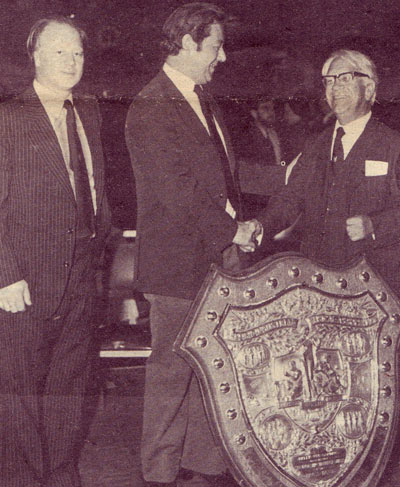
Crowning glory: Walter B Hargreaves enjoys the winning feeling at last
Narrowest margin
Desford as the penultimate contender though very nearly won the day with a performance of startling virtuosity that saw Howard Snell come within a whisker denying Hargreaves the one prize that had eluded him for 30 long years.
”No gimmicks – just real music making” wrote William Relton: “…a really splendid performance,” added Chappell. “A performance of sensitivity, drive and musicianship,” chimed Wetherell.
In the end they gave it 196 marks – the narrowest of margins blankly marking the difference between ultimate success and relative failure – one single point.
Although Yorkshire Imps gave the packed audience a final display of quality (and odd seating formation – something that was a bit of a 70s fad for many bands) to come 6th, all that was left of the breathlessly exciting day was the short concert by James Shepherd Versatile Brass and the award of the Iles Medal to Geoffrey Whitham.
Tension
Tension mounted as the fates were revealed (Michael Antrobus collecting the fourth place award for Dyke with a face that made him look like undertaker accepting a funeral down payment, as one wag noted), whilst there was shouts of joy as Desford were proclaimed runner up.
Then, amongst free flowing tears, Walter B Hargreaves stepped forward to accept the congratulations of Harry Mortimer and the three adjudicators, and to finally stand proud behind the most famous golden shield in banding.
”I left the stage after Fairey had played,” he said afterwards with his wife Kate by his side, “...knowing that was the one that had to be beaten.”
Never a truer or more inspired word had been spoken.
Iwan Fox




